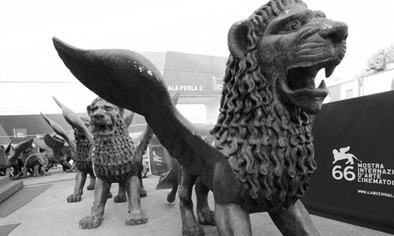|
66th Venice International Film Festival (Sept. 2-12, 2009)
One Thousand and One Islands of Venice
by Antonia Shoraka
|

Venice Film Festival is a luxury and flamboyant event just like the city itself which has apparently turned into Italy’s museum and one may easily forget that in cold months when tourists are not willing to be there, flooding of the streets makes life quite difficult for inhabitants. The festival is not kind to strangers; the guests are barely welcome just for the few days in which their films are screened, let alone the journalists. The only advantage considered for journalists is a card which they can buy for 50 euros and watch any film they want. Otherwise, they should pay 8-28 euros to watch every film at the big hall or 40 euros for 19:30 showtime and that excludes the Red Carpet ceremony. After paying 50 euros, I could watch 15 films and could step on the Red Carpet just for once! Another advantage is that instead of having to pay 28 euros to buy the festival’s catalogue, they can avail themselves of five euros in discount and take part in press conferences and closing ceremony. Now let’s focus on films.
South of the Border, the 20th film of Oliver Stone, is a political reportage. Stone goes to Venezuela in January 2009 to talk to its president, Hugo Chavez, and analyze the image that has been depicted of him by the American media. Is Hugo Chavez as “anti-American” as mass media try to show? The journey takes Stone and his production crew to other countries and the screenplay turns into a travelogue of seven Latin American states with Stone conducting unofficial conversations with their presidents: Venezuela’s Hugo Chavez, Bolivia’s Evo Morales, Brazil’s Lula da Silva, Argentina’s Nestor Kirchner, Paraguay’s Fernando Lugo, Ecuador’s Rafael Correa, and Raul Castro, the brother of Fidel Castro. The main motive for traveling to this region which has been traditionally considered as the United States backyard before becoming problematic under President George Bush was “Iraq experience.” Stone says, “Americans must question the role of our media in demonizing foreign leaders as our enemies. The consequences of this can be brutal.”
What differentiates Stone’s film from a similar movie made by his critical countryman, Michael Moore, is his positive and analytical approach to people and conditions. If Moore resorts to anything to make political disclosures and impress the audience and uses the radical methods employed by the American statesmen to attack them, Stone analyzes the subject. He depicts Bush, who is saying in a televised interview that he is not ready to spend a lot of money to erase an iron-fist dictator like Chavez. That picture is immediately followed by another which shows Chavez on the television screen who firmly says, “Mr. Bush, you are a fool.” Stone has also cast Chavez talking about his plans to make Venezuela self-sufficient in wheat production and accompanies him on a visit to wheat production centers. At the same time, Chavez says, “We are building Iran’s atomic bomb here….” And when he reads bewilderment on the face of the person in charge of the center, he adds, “Of course, one made of wheat!”
The first film of Nader Takmil Homayoun, the Iranian filmmaker living in France, is called Tehroun. It is a street movie which presents a realistic and bitter image of the sprawling capital city of Iran. The relationship between “have-nots” and their web of problems reminds one of neo-realistic films. A young couple moves to Tehran from Kerman and due to hard conditions, they have to hire a kid to panhandle. In the meantime, the kid is stolen and they owe 10,000 dollars to the gang leader who had leased the kid. The woman is enceinte and wants to help her husband. Apart from Attila Pessiani and Pejman Bazeghi, who are among professional Iranian actors, other actors are amateurs. Apparently, the film has had an eye on the foreign markets in addition to domestic screening. Such scenes as marriage at a notary public office, burying the dead, a public bathhouse, and a night party interrupted by the police can be very attractive to people in western countries. The last sequence reminds the viewer of the closing sequence of Francesco Rosi’s Salvatore Giuliano and other Italian films about mafia: the whole scene is a long shot from above and has been shot at Tehran railroad station. The man and his wife, who is holding the kid in her arms, go to the railroad station to return to their city and another couple, who are their friends, sees them off. After farewell, a passer-by jostles as he goes by the man, but in fact, he has hit him with a knife. The man falls on the ground and the hit man escapes. People gradually gather around him while his friends are restless. Thus, the “godfather” has his revenge on the man who has ignored his unwritten law and has betrayed him to the police. The film was warmly welcomed by viewers in International Critics Week section and won that section’s 5,000-euro special prize.
SUBSCRIBE
[Page: 107]
|
|
|
|
|
President & Publisher
Massoud Mehrabi
Editors:
Sohrab Soori
Translators:
Sohrab Soori
Behrouz Tourani
Zohreh Khatibi
Saeed Khamoush
Contributors
Saeed Ghotbizadeh
Mehrzad Danesh
Advertisements
Mohammad Mohammadian
Art Director
Babak Kassiri
Ad Designers
Amir Kheirandish
Hossein Kheirandish
Cover Design
Alireza Amakchi
Correspondents
E.Emrani & M. Behraznia (Germany)
Mohammad Haghighat (France)
A. Movahed & M. Amini (Italy)
Robert Richter (Switzerland)
F. Shafaghi (Canada)
B. Pakzad (UAE)
H. Rasti (Japan)
Print Supervisors
Shad-Rang
Noghreh-Abi
Gol-Naghsh
Subscription & Advertising Sales
Address: 10, Sam St., Hafez Ave., TEHRAN, IRAN
Phone: +98 21 66722444
Fax: +98 21 66718871
info@film-magazine.com
Copyright: Film International
© All rights reserved,
2023, Film International
Quarterly Magazine (ISSN 1021-6510)
Editorial Office: 5th Floor, No. 12
Sam St., Hafez Ave., Tehran 11389, Iran
*
All articles represent views of their
authors and not necessarily
those of the editors
|
|
|

